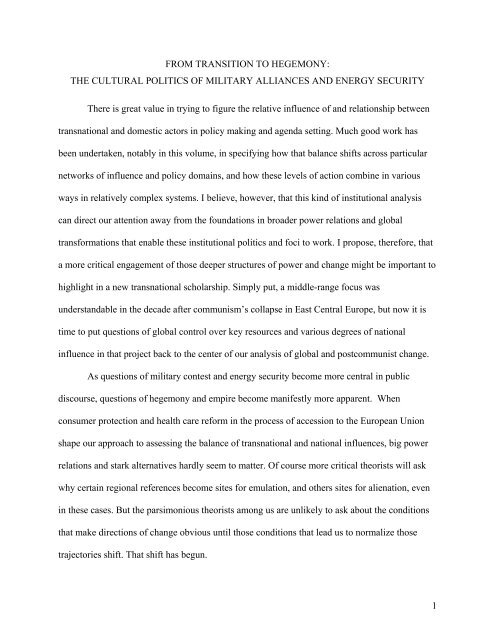from transition to hegemony - The Watson Institute for International ...
from transition to hegemony - The Watson Institute for International ...
from transition to hegemony - The Watson Institute for International ...
You also want an ePaper? Increase the reach of your titles
YUMPU automatically turns print PDFs into web optimized ePapers that Google loves.
FROM TRANSITION TO HEGEMONY:<br />
THE CULTURAL POLITICS OF MILITARY ALLIANCES AND ENERGY SECURITY<br />
<strong>The</strong>re is great value in trying <strong>to</strong> figure the relative influence of and relationship between<br />
transnational and domestic ac<strong>to</strong>rs in policy making and agenda setting. Much good work has<br />
been undertaken, notably in this volume, in specifying how that balance shifts across particular<br />
networks of influence and policy domains, and how these levels of action combine in various<br />
ways in relatively complex systems. I believe, however, that this kind of institutional analysis<br />
can direct our attention away <strong>from</strong> the foundations in broader power relations and global<br />
trans<strong>for</strong>mations that enable these institutional politics and foci <strong>to</strong> work. I propose, there<strong>for</strong>e, that<br />
a more critical engagement of those deeper structures of power and change might be important <strong>to</strong><br />
highlight in a new transnational scholarship. Simply put, a middle-range focus was<br />
understandable in the decade after communism’s collapse in East Central Europe, but now it is<br />
time <strong>to</strong> put questions of global control over key resources and various degrees of national<br />
influence in that project back <strong>to</strong> the center of our analysis of global and postcommunist change.<br />
As questions of military contest and energy security become more central in public<br />
discourse, questions of <strong>hegemony</strong> and empire become manifestly more apparent. When<br />
consumer protection and health care re<strong>for</strong>m in the process of accession <strong>to</strong> the European Union<br />
shape our approach <strong>to</strong> assessing the balance of transnational and national influences, big power<br />
relations and stark alternatives hardly seem <strong>to</strong> matter. Of course more critical theorists will ask<br />
why certain regional references become sites <strong>for</strong> emulation, and others sites <strong>for</strong> alienation, even<br />
in these cases. But the parsimonious theorists among us are unlikely <strong>to</strong> ask about the conditions<br />
that make directions of change obvious until those conditions that lead us <strong>to</strong> normalize those<br />
trajec<strong>to</strong>ries shift. That shift has begun.<br />
1
















